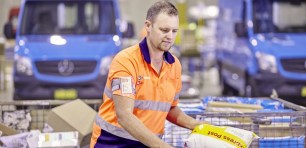
Source: James Ross / AAP Image
The Victorian Labor Party’s state election victory has cleared a pathway for its economic vision, which is based less on small business subsidies and tax cuts than big-picture reforms of the energy market and a plan to boost the number of skilled tradespeople.
Victorian Premier Daniel Andrews formally declared victory for Labor on Saturday night, heralding the party’s third successive stint in power after a term defined by the COVID-19 pandemic.
As of Monday morning, Labor has secured 52 of 88 seats in the Victorian Legislative Assembly, with the Liberals notching 25, and the Greens counting four.
Seven seats are yet to be called.
Despite securing a majority government, Labor has so far faced a downward swing in its primary vote of 5.8% — potentially reflecting concerns in some pockets of the community over the lingering impact of Victoria’s public health restrictions.
Nevertheless, victory for the incumbent party after an “incredibly challenging” period was a sign “hope always defeats hate”, Andrews told supporters on Saturday night.
For the business community, Andrews has promised a suite of big-picture reforms designed to drive down costs.
Unlike the Liberal Party, which focused on small business tax cuts during its election campaign, Labor’s business offerings largely hinge on a new iteration of the State Electricity Commission (SEC).
The party has promised $20 million will go towards revitalising the publicly-owned SEC, with the long-term goal of making electricity generation 100% renewable.
Under the organisation, $1 billion will go towards projects generating 4.5 gigawatts of renewable power, the government claims.
Labor argues that taking ownership of renewable generation sources will ultimately reduce the state’s dependence on increasingly costly fossil fuel generation, with those benefits flowing to businesses through cheaper power prices.
Efforts to bolster the state’s skills mix — a key concern for employers in a tight labour market — focus on an expanded fee-free TAFE program covering “in-demand jobs” across healthcare, mental health, construction, early childhood care and hospitality.
The Andrews government also says it will cover the car registration fees for eligible apprentices, easing cost-of-living pressures which may deter young workers from pursuing a trade with hefty transportation costs.
In July, Labor revealed a $25 million plan it says will support the prosperity of Aboriginal Victorians and the business communities they create.
It will “increase support for Aboriginal entrepreneurs and businesses, including improved access to capital, information and expertise”, according to a report detailing the plan.
Further details will arise as the Andrews government settles in for its third term and contemplates its next small business minister — a role left vacant by MP Jaala Pulford, who announced she would not recontest her seat at Saturday’s election.
Handpicked for you

Australia Post brings forward Christmas cut-off dates for WA and NT due to floods and rail disruption



COMMENTS
SmartCompany is committed to hosting lively discussions. Help us keep the conversation useful, interesting and welcoming. We aim to publish comments quickly in the interest of promoting robust conversation, but we’re a small team and we deploy filters to protect against legal risk. Occasionally your comment may be held up while it is being reviewed, but we’re working as fast as we can to keep the conversation rolling.
The SmartCompany comment section is members-only content. Please subscribe to leave a comment.
The SmartCompany comment section is members-only content. Please login to leave a comment.